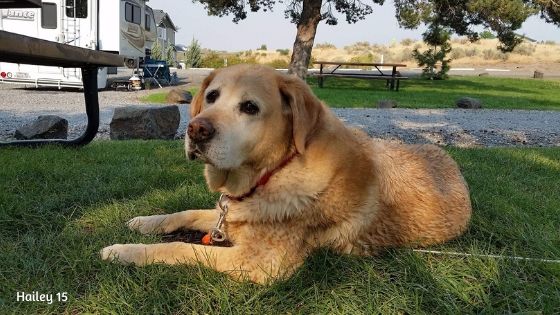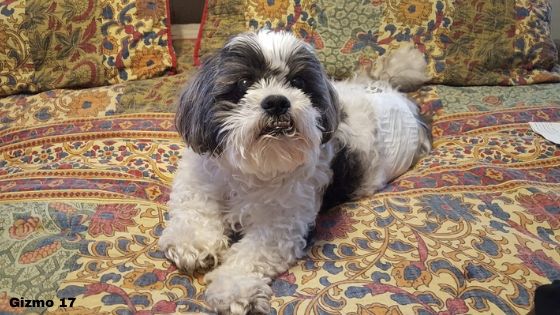
I see a lot of posts from people whose senior dogs have become aggressive, when their other, younger dogs have not. If that’s the case with so many, it’s not surprising when they question if older dogs are more or less aggressive.
There are certainly situations when older dogs may be more aggressive than younger ones, but then again, the reverse can also be true. Things will become very clear if you just keep reading!
A young dog who has been abused may be aggressive towards humans as he protects himself, while an old dog may exhibit that behaviour because he’s in pain. Older dogs are not more or less aggressive than any other age, but rather it is circumstances that is the cause.
What can senior dog aggression look like?
- Snapping
- Snarling
- Nipping or biting
These behaviours can be directed at you, family members, strangers, other pets in the home and dogs he meets on his walks
What causes aggression in older dogs
Pain or discomfort
It’s very common for a dog that is experiencing some kind of pain or discomfort to lash out. People are often taken aback when their usually docile and good- natured dog suddenly wants to take a chunk out of their hand!
The reaction can be the same whether the pain is caused by dental disease, arthritis or even surgery to name just a few reasons.
Signs your dog may be in pain
Dogs are quite good at hiding pain, so here are some obvious, and not so obvious indicators
- Whining or whimpering
- Clinginess
- Lack of interest in things he used to enjoy
- Reluctant to go for walks/unable to walk
- Lethargy
- Difficulty sleeping or resting
- Licking one spot on his body
- Difficulty getting up and lying down
Anxiety
As dogs get older it’s not uncommon for them to experience anxiety, which can take many forms including aggression.
Anti-anxiety medication, a plug-in diffuser called Adaptil, CBD oil or Rescue Remedy are just a few options to consider that may help.
Dental disease
Remember what a toothache felt like? Imagine your dog experiencing that sort of pain, and being unable to tell you. Actually…he can. Bad breath, pawing at his mouth, drooling, loss of interest in food and yes aggression can all be indicators of dental disease. Treat the problem and the pain and aggression will both disappear (assuming it was the sole cause of the behaviour).

Mobility issues
If your dog is experiencing join pain, trying to pick him up can cause him to lash out. Even attempts for his doggie friends to play can be met with a baring of teeth. Thankfully there are medications, supplements and alternative therapies to help ease the symptoms.
This article “What is the Best Natural Arthritis Pain Relief for Dogs” will give you some more advice.
Dementia
Confusion, anxiety and not recognising the familiar are just some of the symptoms associated with dementia. Sadly, it can also lead an otherwise sweet natured dog to display some aggression.
This article, “My Life as a Dog with Dementia” can give you insight on what it’s like. It’s worth a read!
Vision and/or hearing loss
Imagine how scary it must be for your dog as he starts to lose his hearing, vision or both. He has no idea what’s going on, and because he is startled more easily, he may react in an aggressive manner before he realises who’s approaching him.
It’s important to make adjustments to accommodate these changes in your dog, and they include –
- Making your presence known before touching him
- Not moving furniture so he doesn’t bump into things, hurt himself and get scared
- Keep floors clutter free so he doesn’t trip, get hurt and become anxious
- Try and keep noise and activity level down for a bit
I shared my life with a blind dog for 9 years, and these are the tips that worked well for us. Try them and let me know what worked for you! “How to Keep Your Blind Dog Safe.”
Brain tumour
Not common but not unheard of, a mass on the brain can cause a sudden change in personality, including aggression.
A new pet is annoying him
Your old dog may be aggressive towards the new pet introduced into the home, especially if he or she is a puppy that keeps jumping on his sore bones.
- Give the newcomer his own toys, food bowls etc…
- Be sure to lavish a ton of attention on your old dog
- Never let your new dog irritate the old one
How to deal with aggression in older dogs
Take your dog to the vet
The first thing to do is make a vet appointment. Aggression in older dogs means there is something going on, so don’t wait. A problem caught earlier has a better chance of responding to treatment.
Make notes
Record things like –
- When did the aggression start/how long has it been going on
- Is it happening at a certain time of day
- How does he express his aggression
- What was your dog doing right before it happened
- Was anyone bothering the dog at the time
This will help identify a pattern and may help your vet with the diagnosis. Try and get some video as well!
Create a safe space
Make sure your dog has a safe space to retreat to, an area that is his where no one will bother him. Whether you want to add a covered crate he can crawl into (leave the door open) or set up a bed in a quiet corner or another room, it’s important to keep him away from stress.
Play calming music
A CD called “Through a Dog’s Ear” was a sanity saver in our home. You can find a free 13 minute sampler on YouTube. There is a lot of dog calming music available, this is the one that worked well for us. It has a yellow cover.
CBD oil
While I don’t believe CBD oil is a cure for everything that ails humans and animals, the success stories I read from senior dog parents I know is compelling, and cannot be ignored. Not all are created equal so do your research. One brand that has been very helpful to many of my FB group members is NuLeaf. (This is an affiliate link, so if you buy something I may receive a small commission. It has no effect on the price you pay.)
Valerian or Valerian with Skullcap
This supplement can be very effective at treating anxiety, if that is the cause of aggression. You can buy one specially formulated for dogs or a human grade supplement. Ask your vet for help in figuring out the correct dosage.
Thundershirt
Another tool to help control anxiety is The ThunderShirt. It applies constant, gentle pressure and helps calm anxiety and fear. With an over 80% proven success rate and a money back guarantee, you can’t go wrong. I wrote a review about this product, and includes testimonials from those who have used it and seen great results. As with anything, there is no guarantee it will work for every dog.
While this sudden aggression can be a shock, I do hope you’ve found comfort in this post, knowing there are ways to determine the cause, and options to help treat it.

Leave a Reply